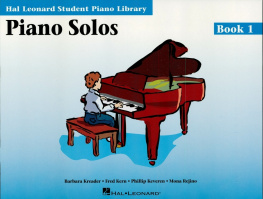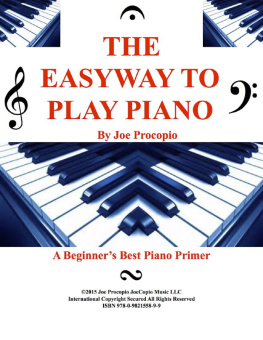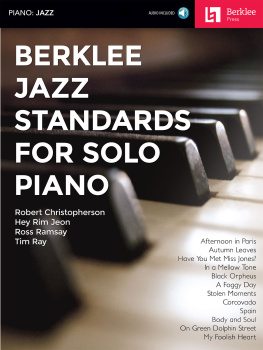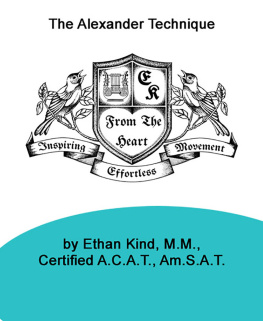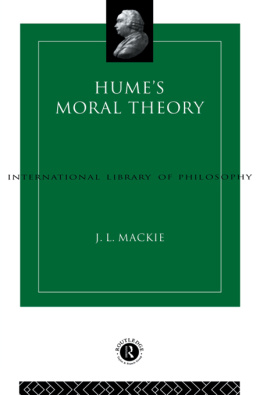MacKie - Rethinking Piano Performance: A Mind/Body Approach
Here you can read online MacKie - Rethinking Piano Performance: A Mind/Body Approach full text of the book (entire story) in english for free. Download pdf and epub, get meaning, cover and reviews about this ebook. year: 2015, genre: Romance novel. Description of the work, (preface) as well as reviews are available. Best literature library LitArk.com created for fans of good reading and offers a wide selection of genres:
Romance novel
Science fiction
Adventure
Detective
Science
History
Home and family
Prose
Art
Politics
Computer
Non-fiction
Religion
Business
Children
Humor
Choose a favorite category and find really read worthwhile books. Enjoy immersion in the world of imagination, feel the emotions of the characters or learn something new for yourself, make an fascinating discovery.
- Book:Rethinking Piano Performance: A Mind/Body Approach
- Author:
- Genre:
- Year:2015
- Rating:5 / 5
- Favourites:Add to favourites
- Your mark:
- 100
- 1
- 2
- 3
- 4
- 5
Rethinking Piano Performance: A Mind/Body Approach: summary, description and annotation
We offer to read an annotation, description, summary or preface (depends on what the author of the book "Rethinking Piano Performance: A Mind/Body Approach" wrote himself). If you haven't found the necessary information about the book — write in the comments, we will try to find it.
MacKie: author's other books
Who wrote Rethinking Piano Performance: A Mind/Body Approach? Find out the surname, the name of the author of the book and a list of all author's works by series.
Rethinking Piano Performance: A Mind/Body Approach — read online for free the complete book (whole text) full work
Below is the text of the book, divided by pages. System saving the place of the last page read, allows you to conveniently read the book "Rethinking Piano Performance: A Mind/Body Approach" online for free, without having to search again every time where you left off. Put a bookmark, and you can go to the page where you finished reading at any time.
Font size:
Interval:
Bookmark:
Rethinking Piano Performance
A Mind/BodyApproach
Cristine MacKie
Copyright CristineMacKie 2015
This book is soldsubject to the condition that it shall not, by way of trade or otherwise, be lent,resold, hired out, or otherwise circulated without the publisher's priorconsent in any form of binding or cover other than that in which it ispublished and without a similar condition including this condition beingimposed on the subsequent publisher.
The moral right ofCristine MacKie has been asserted.
Dedicated to myhusband Ivan Baker for never appearing to weary of this long venture.
ACKNOWLEDGEMENTS
Too many to thank,I will single out the British Library, Senate House, Laurin MacKie for hispainstaking editing, Adam MacKie for technical advice, family, friends andcolleagues who gave their time to discuss writing style among other issues;Iqbal Hussein (a member of the Osteopathy Council) who gave his time to discussstructural anatomy and function; the Design Studio at Royal Holloway forreproducing some of my drawings; and last, but not least, my thanks to JohnRink who introduced me to another way of thinking about music.
Jonathon Dunsbywrites: We are still too bound to romantic ideology; performing should not beviewed as a strictly intuitive, ineffable process. It takes hard thinking
Performing Music:Shared Concerns (1995).
Charles Rosenwrites: The musician who has surrendered his will to tradition has abandoned thepossibility of keeping the tradition alive.
Piano Notes (2002).
Richard Dawkinswrites: It is the essence of science to know what we do not know.
Unweaving theRainbow (1998) - similarly, the essence of skilled pianoperformance is to know that which we do not know. C. MacKie (2014)
Contents
Withthe great black piano appassionato
-Piano, by D.H. Lawrence (1918)
Iwas quite unaware of the ambivalence towards the role of the body in pianoperformance, especially movement, which was and still is widely prevalentamongst pianists and piano pedagogues even today, when in late adolescence Ifell deeply and wholly in love with the great black piano appassionato duringa performance of all twenty-four preludes by Chopin, given by the pianistMindru Katz at the Royal Festival Hall. During his rendition of the fourthprelude in E minor, I was seduced and thought to myself: I can do that.
Whatwas the reason for this thunderbolt from the blue? The prelude with, as Samsonwrites in Chopin (1996), its powerfully expressive and affectivequality created an absolutely satisfying synthesis of body and soul - butthere were other components too. The need to do it myself was born at thatmoment from a longing for physical contact with the keys and a desire to sit atthe instrument and survey its depths under the raised, gleaming black lid - toset the strings in motion along its great length, and to produce for myself thewelling and dying of the sounds which seemed to match my own alternating senseof ecstasy and sadness.
Iwas wholly ignorant of the difficulties ahead. It didnt matter, I would find away. However, I quickly discovered that I was not a natural pianist. There weremany false starts, and after some years of studying with a variety of teachers,each of whom enforced their different methods which were steeped in the Westernmind/body dualism, I was brought to my senses after it was recommended that Ishould practice the Chopin Ballade in G minor, using the weighttransference method. This entailed throwing the full weight of the armonto an unsupported finger, and maintaining the pressure on the key bed untilthe next note was sounded in the same way. I practised like this diligently forsix hours every day for a month. Inevitably, excruciating tendonitis developedand I finally learned, as Rosen (2002) advises in Piano Notes, to becontinually suspicious of those performers and pedagogues who claim tohave invented the only successful method in bringing the best out in youngperformers.
Ithen spent several years rebuilding my technique so that my hand could functionin the way that it is designed to, i.e., I developed the ability to caress orgrasp the keys. Vital as this development was, I continued to practice thistechnique without engaging the hinterland, or placing it within a musicalcontext. This is because I had no understanding of the structure and functionof the shoulder complex and the torso, let alone that there could be asynthesis between my musical mind and my body. This was not altogethersurprising, since at that time the idea of forging a link between the role ofanalysis - in the traditional sense - and the role of the body in performance wasalmost unthinkable.
However,change was afoot, for in 1989 Wallace Berry wrote Musical Structure andPerformance, in which hequestions how a structural relation exposed in analysis can be illuminated inthe inflections of edifying performance (p. 1). Since then, much criticism hasbeen levelled at Berry for his seemingly rigid application of analysis toperformance. Nevertheless, this work is of immense importance for performers,as is the scholarly writing about musical performance in general which hasburgeoned since then, bringing together ideas and research from a wide range ofscientific and musical fields.
Thatsaid, and in spite of my intention to unravel many of the unsolved mysteries ofpiano performance by exploring the interface between science and the art ofpiano performance, this ambition should form only a part of the widercommitment to art itself, and I will never forget the feelings which werearoused when I first encountered the great black piano appassionato,and which still remain so powerful and affecting.
It seems that so long aswe are alive, we shall continue closest to knowledge if we avoid as much as wecan all contact and association with the body, except when they are absolutelynecessary
- Socratesc. 469-399 BC
Since the ideas controlling piano pedagogyand performance have been largely allied to the structure of Western thought,which nurtures a mind/body dualism, I will begin by giving a brief account ofsome of the reasons for this, and of some contributions by anthropologists,phenomenologists and philosophers, which may help to support the view thatpiano performance is a matter of engaging the mind as well as the body. Theshort references to the works of Casy, Descartes, Mauss, Merlieu-Ponty,Shusterman, Yates, Clarke and Davidson, amongst a few others, whose viewssupport, in part this standpoint, are intended first, to provide a generalbackground only, and second, a guide for the reader who wishes to pursue theseissues more deeply.
Background
TheMind/Body Dualism
Casy (2000) suggests that two developments inWestern culture occur which contribute towards this trajectory ofdisembodiment (p. 108). The first is that on the whole, Western culture growsto value the subjugation of the flesh for religious goals. In Christianity, forexample, celibacy is indicative of spiritual purity - that is to say, arenunciation of the world and the flesh in favour of the spirit and the lightof God (p. 108). This mode of thought is, in part, in keeping with the Greektradition, and inevitably creates ambivalencetowards the body. As Casyeloquently puts it, the human person mirrored with terrible precision, theconfusion that lay at the root of the physical universe (p. 108).
However, it is Descartes (1596-1650) who is held largelyresponsible for the mind/body dualism, 3 arguing that there are twoclasses of substance which make up the human organism; they are first, thepalpable body; second, the intangible mind. He develops this philosophy withinthe framework of Christian theology, believing that God and humanity arecentral to the universe. And, since God made man in his own likeness, God musthave a body [which means that] He must have the means of keeping His essencepure from any bodily corruption (p. 42). To resolve this dichotomy, Descartesfocuses on the soul/body opposition - making the soul distinct from the bodywhile relating the soul to God. Purity, then, is obtainable through celibacy,and the erotic desire of the body is seen as an aberration.
Next pageFont size:
Interval:
Bookmark:
Similar books «Rethinking Piano Performance: A Mind/Body Approach»
Look at similar books to Rethinking Piano Performance: A Mind/Body Approach. We have selected literature similar in name and meaning in the hope of providing readers with more options to find new, interesting, not yet read works.
Discussion, reviews of the book Rethinking Piano Performance: A Mind/Body Approach and just readers' own opinions. Leave your comments, write what you think about the work, its meaning or the main characters. Specify what exactly you liked and what you didn't like, and why you think so.



